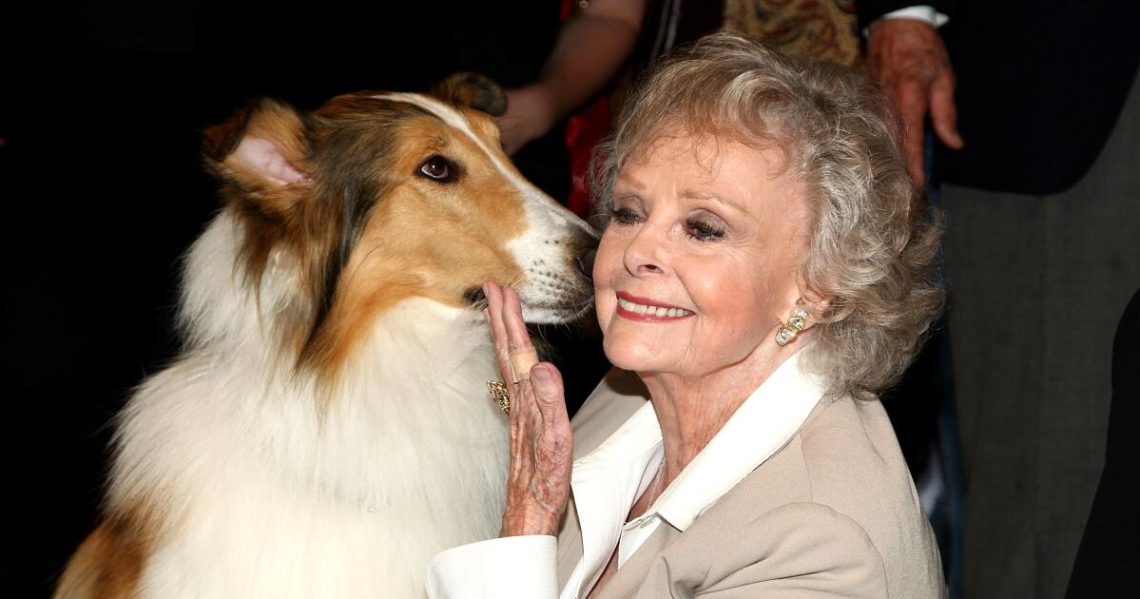In the two decades following the end of the Second World War, the culture gods declared that families should be nuclear, which is not to say atomic, and that women, who had joined the work force in record numbers with men away in the military should get back into the kitchen. On television it was, therefore, an age of mothers — wise domestic goddesses whose energies were turned largely toward the raising of children. Barbara Billingsley (June Cleaver in “Leave It to Beaver”), Jane Wyatt (Margaret Anderson on “Father Knows Best,” but did he, really?), Donna Reed (Donna Stone on “The Donna Reed Show”), Harriet Nelson (as … Harriet Nelson on “The Adventures of Ozzie & Harriet”) and, most certainly, the late June Lockhart, who played a mother on the boy-and-his-dog adventure series “Lassie” and on “Lost in Space,” Irwin Allen’s science-fictionification of “The Swiss Family Robinson.”
Pretty in an unintimidating way, with wide-set eyes, an upturned nose and a broad smile that made her instantly recognizable her entire life, Lockhart, who died Thursday at 100, played strong women with a sunny matter-of-factness, sometimes restricted by the prejudices of the time — which is to say, by what writers felt a woman on television could be shown to do — but always able to do what needed to be done. She might turn stern, or get upset, but her overarching qualities were predictability and stability, which is what any child wants from a parent, after all.
June Lockhart — it’s a name you might have invented for her if she weren’t already named June Lockhart. She was born in June — June 25, 1925 — the daughter of actors Gene and Kathleen Lockhart. Her first film role was alongside her parents in a 1938 production of “A Christmas Carol.” They were all Cratchits.
Her early career was that of a second-tier Hollywood contract player — a memorable supporting scene in “Meet Me in St. Louis,” the lead in the unmemorable “She-Wolf of London.” Television, when it arrived, offered a series of episodic guest shots, until in 1958, at 33, Lockhart joined the cast of “Lassie,” replacing Cloris Leachman, who had played the role of Ruth Martin for a single season as the series transitioned from its initial “Jeff’s Collie” seasons to the better remembered “Timmy and Lassie” years. (It continued past those, until 1973.)
Descended in a crooked line from the 1943 Elizabeth Taylor and Roddy McDowall film, “Lassie Come Home” — Lockhart had appeared in the war-themed follow-up “Son of Lassie” as a romantic interest for Peter Lawford — the series was the quintessence of sentimental wholesomeness. Yet for all the corn, it remains surprisingly watchable, six decades on. Indeed, writing this little tribute has been slowed down considerably by my watching.
Jon Provost played Timmy, a well-intentioned but improvident child who often finds himself in life-threatening situations that require Lassie to alert his folks and guide them to him. (It isn’t the only sort of dilemma the family will face, but it does happen a lot.) Nominally a farmwife, Ruth’s style is suburban homemaker, typically wearing an apron over a shirtdress, even when not working in the kitchen — the implication being that she just was, or she’s about to be. (In one episode, she waxes ecstatic over “a brand new second hand electrically operated gleaming white modern refrigerator” to replace their old icebox. Lassie, less enthused, refuses to eat food from it. Ruth to Lassie: “We have no room in this house for two stubborn females.”) Once in a while, if she’s rustled out of bed by some nocturnal emergency, she may be pictured in a robe with hair down; seeing her, atypically, at the top of an apricot tree, wearing a sun hat and doing some actual farmwork for once, is strangely exciting.
Timmy had a father, too — he was actually a foster child, a point the series does not belabor — Paul, played by Hugh Reilly, who did not achieve the level of pop cultural permanence as Lockhart; if you had told me that Ruth was a single mother, I would have believed you. The odd thing about watching the show now, as a discerning adult, is noticing how little the dog — or the dogs, three in Provost’s tenure — relates to the boy; he’s always looking off toward his trainer, like an actor leaning on cue cards. (Lassie was female, but the dogs who played her — including Pal, Lassie Junior, Spook, Baby, Mire and Hey Hey — were male.) Because she’s almost always at home, Ruth is the human Timmy spends the most time around; on a level of shared scenes and actorly connection, “Lassie” was the story of a mother and son.
Lockhart’s casting as Maureen Robinson in “Lost in Space” feels like a line drawn from Ruth Martin, “Lassie” having established her as an archetypal figure of motherhood. In that Maureen has a young son who gets into scrapes and has a non-human friend that tries to keep him safe — “Danger, Will Robinson!,” quoth the Robot — “Lost in Space” sounds a distant echo of the earlier series. But it’s a show without intimacy; there are too many other characters getting in Maureen’s way, and son Will (Billy Mumy) spends all his time with comically, cowardly Dr. Smith (Jonathan Harris), getting into increasingly absurd scrapes. Maureen’s astro-husband, professor and Lt. Col. John Robinson (Guy Williams), is not a gentle helpmate like in “Lassie,” but the mission’s ranking officer, who tends to act like one even among the family. Maureen is ostensibly a biochemist but her job around the spaceship is basically to garden and cook; she’s there to be a mother when one is (rarely) needed, to represent the mature female element, smile indulgently, tell the kids to be careful and generally to inject warmth and humanity into the chilly reaches of space. She’s underused but absolutely necessary.
In her third regular television role, on the countrified sitcom “Petticoat Junction,” Lockhart played a physician new to the fictional hamlet of Hooterville; it takes the citizens a three-episode arc to get them to accept that a doctor could be a woman, and a woman a doctor. (“Here’s a lady MD/She’s as pretty as can be,” run the lyrics in the revamped theme song, encapsulating the culture’s confusion over what to value in a woman.) She entered the series, part of what might be called the Beverly Hillbillies Extended Universe along with “Green Acres,” in 1968, immediately upon the cancellation of “Lost in Space,” as a replacement for the late Bea Benaderet‘s Kate Bradley, proprietor of the Shady Rest Hotel. Her Dr. Janet Craig is single and childless (not widowed, the standard marital status for single women over a certain age), but the show sets her up as a substitute, surrogate mother to Kate’s three adult girls. The actor radiates happiness in a happy role in a happy show.
Lockhart played a mother again (widowed) in the 1974 “These Are the Days,” a single-season “realistic” animated cartoon about a family at the turn of the 20th century. She hosted beauty pageants and the Rose Parade and Macy’s Thanksgiving Day Parade, appeared on game shows, recurred on “General Hospital,” and made many guest appearances on episodic television, from “Magnum P.I.” to “The Drew Carey Show” to “Grey’s Anatomy.” She made a cameo in the 1998 “Lost in Space” film, where Mimi Rogers played her old character, and performed the voice of Alpha Control in the series 2018 Netflix reboot, in which Molly Parker played Maureen. They may have been given more to do than Lockhart — the Netflix series is excellent — but they are still squatters on space that she cleared, and will own forever.
The post Appreciation: Strong and warm, June Lockhart was a model of TV motherhood appeared first on Los Angeles Times.




